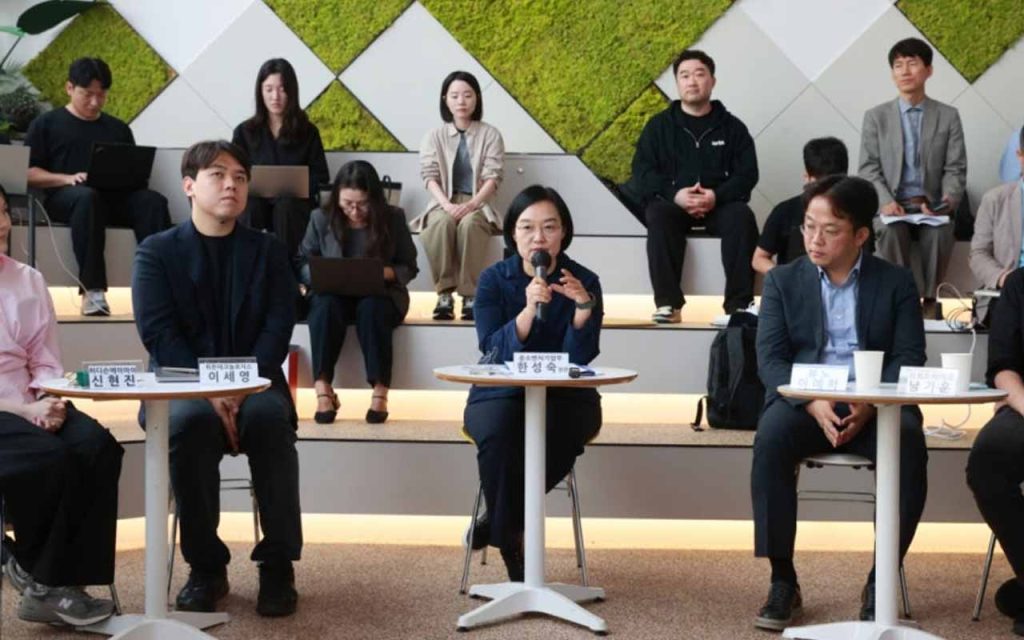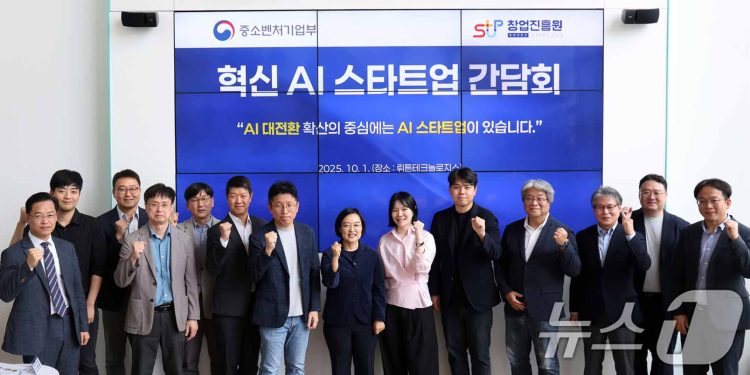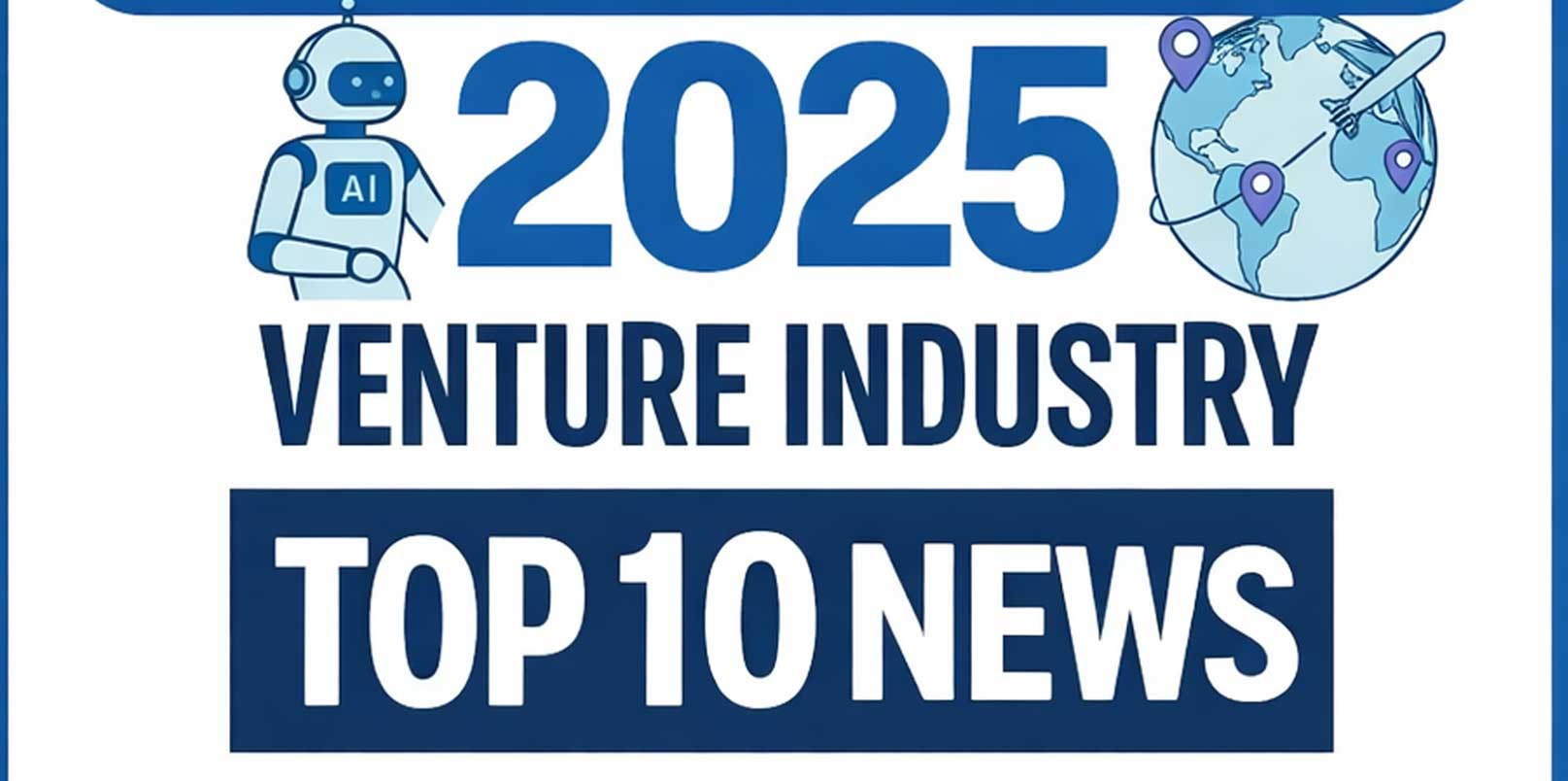Korea is sharpening its AI transformation (AX) strategy by directly linking startups with small and medium-sized manufacturers. At a Seoul roundtable, policymakers and founders debated how to bridge structural gaps in adoption, expand testbeds, and secure market pathways. The effort reflects not only a national AX policy milestone but also a model for how industrial economies in Asia-Pacific can anchor startup-led innovation.
Korea Expands AI-SME Collaboration at Wrtn Roundtable
On October 1, Minister Han Seong-sook of the Ministry of SMEs and Startups (MSS) convened the Innovation AI Startup Roundtable at Wrtn Technologies in Seoul. The session brought together ten AI startups and SME representatives to discuss how artificial intelligence can be applied across manufacturing, biohealth, content, and finance.
Minister Han emphasized that Korea’s AI Great Transition (AX) depends on bridging the divide between traditional SMEs and AI startups. She noted that SMEs face difficulties applying advanced technologies without structured support and highlighted the government’s role in building testbeds and matching demand companies with technology suppliers.
Why Linking Startups and SMEs Matters for AX Policy
MSS acknowledged that while Korea is pursuing the goal of becoming “the world’s best user of AI,” the adoption gap between large firms and SMEs remains wide. High implementation costs and the shortage of AI talent have slowed progress at the SME level, even as automation expands in larger corporations.
Two-thirds of AI companies in Korea are startups, with nearly half directly developing AX technologies. Yet many lack the infrastructure to test their solutions or secure market entry.
MSS said its open innovation framework aims to resolve this mismatch by leveraging large company infrastructure and connecting startups with SME demand firms from the early stages of development.
Stakeholders Call for Testbeds and Long-Term Support During Wrtn Roundtable
Minister Han Seong-sook explained the government’s intention clearly:
“To support the AI transformation of SMEs and small businesses, we will create a venue where innovative startups that are AI technology supply corporations and manufacturing SMEs that apply this technology can meet. We are also considering testing which parts on the ground SMEs should apply AI to and how the effects will appear.”

Her remarks were echoed by startup leaders who stressed the importance of test environments and long-term collaboration.
Choi Jae-sik, CEO of Ineeji and member of the National AI Strategy Committee, explained:
“Client companies can only adopt technologies once they have undergone multiple tests. Policy support is needed to ensure more testing can be done on-site before real deployment.”
Other founders called for long-term collaboration with large firms, warning that many proof-of-concept projects end without scaling opportunities. Startup representatives urged MSS to ensure that government-backed open innovation programs connect early testing with commercialization and export pathways.
AX Policy in Action: Manufacturing, Bio, Content, and Finance Priorities
MSS announced that its AX policy will prioritize open innovation tailored to sectoral value chains.
- Manufacturing: Collaboration will expand into seven subsectors including automotive, shipbuilding, and home appliances.
- Biohealth: The ministry will link startups with major pharmaceutical firms, hospitals, and overseas research institutions to support drug discovery and Healthtech.
- Content and Finance: Startups will gain access to public testbeds and sectoral demand partners to validate AI-driven business models.
Minister Han underlined the urgency of execution, noting that SMEs often lack both the time and budget to experiment with AI. She said the government will accelerate budget deployment in 2025 and shorten review and launch periods for related projects.
How Korea’s AI Testbeds Could Redefine Startup Scaling
The initiative marks a critical shift in Korea’s AI adoption strategy. Instead of relying only on top-down infrastructure, policymakers are positioning startups as central drivers of industrial AI transformation.
Founders gain expanded access to state-backed demand matching, testing, and scale-up pathways. Meanwhile, investors see a system that embeds AI innovation at the SME and cluster level, moving beyond chaebol conglomerates. Not only that but open innovation pipelines in manufacturing and biohealth are also being designed as replicable models with potential to attract cross-border interest and export opportunities.
Moreover, this initiative also resonates with broader Asia-Pacific trends, where governments are seeking to balance startup dynamism with SME digital transformation. If implemented effectively, Korea’s AX policy testbed programs could serve as a blueprint for industrial AI adoption across the region.
Korea’s Next Phase in AX Policy
The Wrtn roundtable reinforced that Korea’s AI transformation hinges on more than technology supply. It requires demand-side readiness, test environments, and sustained collaboration. By linking startups and SMEs through open innovation, MSS is attempting to close long-standing gaps in the industrial ecosystem.
As AX accelerates, the success of these measures will determine not only whether Korea’s SMEs can stay globally competitive, but also whether the country can credibly position itself as a hub for industrial AI adoption in the Asia-Pacific.
– Stay Ahead in Korea’s Startup Scene –
Get real-time insights, funding updates, and policy shifts shaping Korea’s innovation ecosystem.
➡️ Follow KoreaTechDesk on LinkedIn, X (Twitter), Threads, Bluesky, Telegram, Facebook, and WhatsApp Channel.






